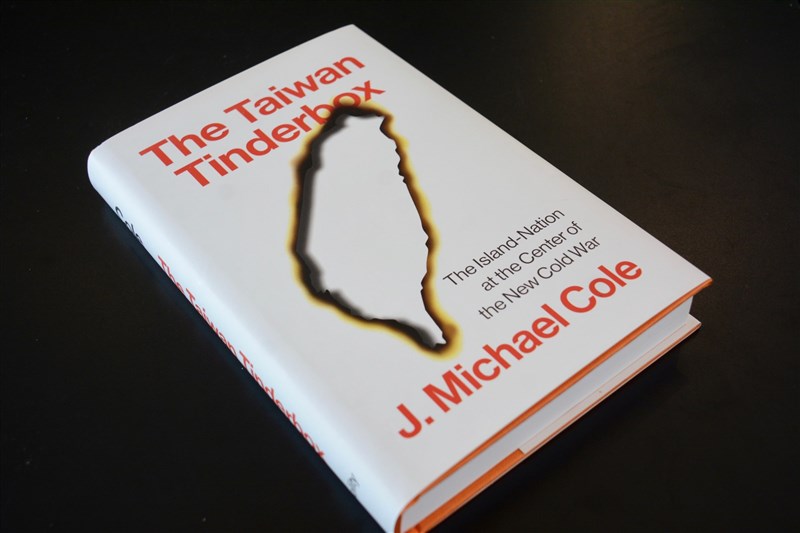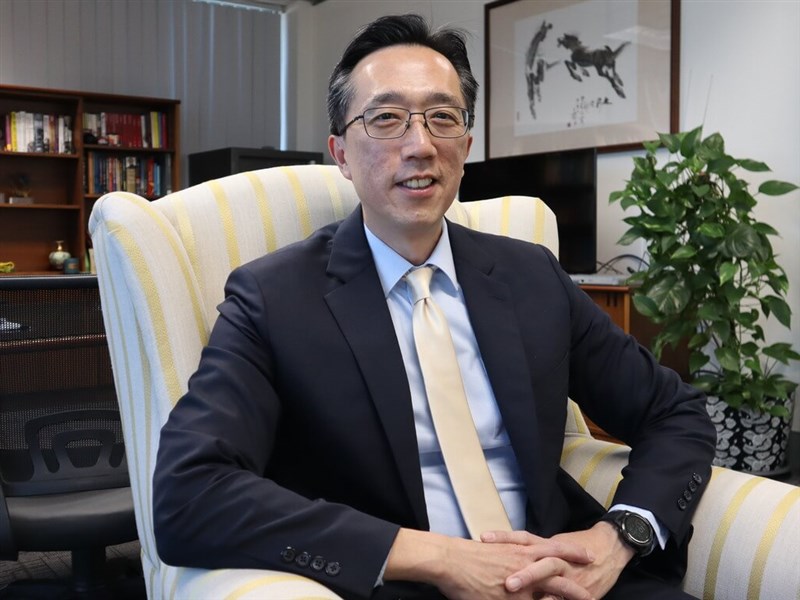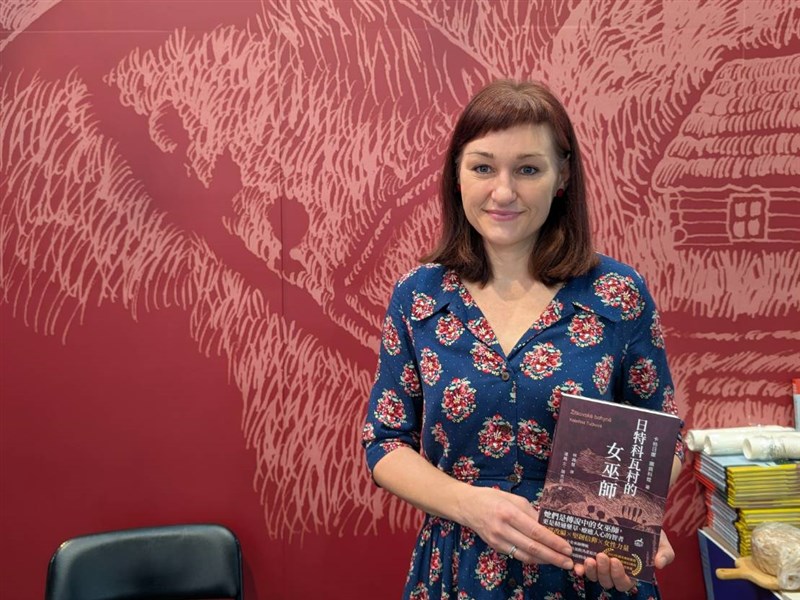INTERVIEW / Defending Taiwan crucial to global stability: J. Michael Cole

By Sean Lin, CNA staff reporter
Since Russia launched its full-scale invasion of Ukraine in February 2022, many comparisons have been drawn between Ukraine and Taiwan, which also faces an aggressive neighbor intent on eroding its sovereignty.
Just as many have contended that it is critical to hold Russia in check in Ukraine, Taiwan-based Canadian author J. Michael Cole argues in his new book, "The Taiwan Tinderbox," that defending Taiwan against a Chinese invasion is key to maintaining global stability.
In a recent interview with CNA, Cole cited Ukraine's resistance against Russia's invasion in highlighting the interdependence among democratic countries that has underpinned the international order.
Lessons from Ukraine
"[Russian President] Putin was actually convinced that Kiev would fall in a matter of days," Cole said.
"The fact that this did not happen and that three years on we're still talking about war in Ukraine also sends a signal to places like Beijing and Tehran," said Cole, a senior non-resident fellow with the Global Taiwan Institute.
It showed "that if you think that invading another country is a walk in the park, you'd better think again, because it's costing you a lot of money, a lot of lives and your reputation as well," Cole said.
The message would be the reverse, he argued, if China were to take Taiwan quickly -- whether because Taiwan was defeated or abandoned by the international community.
It would send a "dangerous" signal to other destabilizing forces and authoritarian regimes that they, too, could achieve their objectives through force, he said.
"Ultimately, defending Taiwan, just like defending Ukraine, is not only in the interest of Taiwan and Ukraine, but the international community of democracies, that if you win that battle there, chances are you won't have to fight battles somewhere else," he said.
"If you lose that battle there, it's likelier that you're going to face different battles, possibly in your own neighborhood," he said.
Xi's ambitions and PLA's growing power

While Cole refrains from giving any predictions on whether Chinese leader Xi Jinping (習近平) will launch an attack on Taiwan, he presented in his book a gamut of facts that could influence Xi's decision-making on whether to invade Taiwan.
For example, Cole wrote about Xi's ambitions to absorb Taiwan to realize his "Chinese dream," looking at evidence from past events, notably his cancellation of the two-term limit for Chinese presidents in 2018 that allowed him to stay in power indefinitely.
He has also purged potential rivals within the Chinese Communist Party, but Xi's consolidation of power does not end there.
Xi has also substantially narrowed his circle of advisers on the Central Military Commission, which he heads, Cole wrote.
That has left those advisers reluctant to give advice that would run counter to his own, increasing the risk of miscalculation when it comes to using force on Taiwan, Cole argued.
"This kind of hubris and reluctant councils increase the risks that a leader's folly will drag an entire country into catastrophe," Cole wrote.
Meanwhile, Xi's rise to power has coincided with the emergence of the People's Liberation Army as a more modernized and formidable fighting force, he said.
The stage has therefore been set "for a highly ideological leader to present himself as the Chinese leader who could finally accomplish the long-sought dream of 'reunifying' Taiwan."
Asked whether China's growing military power, anti-access/area denial capabilities and expanding nuclear arsenal could decrease the United States' willingness to send forces to Taiwan's aid in a Taiwan Strait war, Cole said it "certainly becomes part of their calculations."
Citing Moscow's threat to Western countries that it could use nuclear weapons against them should they interfere with the war in Ukraine, Cole argued China could make similar threats to prevent the U.S. from becoming involved in a Taiwan Strait conflict.
Preparing Taiwan for self-defense
Taiwan must, therefore, take steps to prepare itself to fight independently, Cole said.
"The greatest responsibility for Taiwan's defense is obviously with the Taiwanese people themselves," he said.
"There is not a single country on the face of the planet that behaves purely altruistically. If the U.S. or other countries calculate that they need to come to Taiwan's assistance, it's because they think that it is in their national interest to do so, and that you can't take for granted."
One way Taiwan can harden its defenses, he said, is by actually training civilians to fight before war breaks out, rather than simply conducting polls gauging people's willingness to fight.
Such polls are bound to be overly optimistic, Cole said, as people's willingness to fight will diminish under the shock of actual combat.
"If and when the bombs start raining down on your neighborhood, you just don't know how you would react...The only people who really know how they would react under those circumstances are people who underwent training," Cole said.
Cole argued that is why military organizations worldwide regularly train professional soldiers, conscripts and civilians on how to react in the event of war, so that it becomes a "reflex."
Sanctions and strategic preparedness
Meanwhile, countries could apply what they learned from imposing sanctions on Russia to signal to Beijing that it will face penalties that will "have a bite" if it invades Taiwan.
For example, he said, G7 countries play a significant role in China's access to high technologies and could impose severe trade restrictions on advanced semiconductors and optical materials, which China relies on to modernize and fuel its economy.
That, however, will require countries to prepare for such an eventuality.
"If you start asking countries to impose major sanctions on China in different sectors, they already need to have prepared their societies and their economies to quickly turn around so that they themselves do not suffer the consequences of imposing sanctions," Cole wrote.
Enditem/ls
-
![Taiwan's top envoy to Australia seeks cooperation on minerals, drones]() Taiwan's top envoy to Australia seeks cooperation on minerals, dronesAs Australia looks to recalibrate its economic relationship with China, Taipei is hoping to strengthen bilateral ties and partner with Canberra in such areas as critical minerals and drones, said Douglas Hsu (徐佑典), Taiwan's representative to Australia.02/26/2026 11:16 AM
Taiwan's top envoy to Australia seeks cooperation on minerals, dronesAs Australia looks to recalibrate its economic relationship with China, Taipei is hoping to strengthen bilateral ties and partner with Canberra in such areas as critical minerals and drones, said Douglas Hsu (徐佑典), Taiwan's representative to Australia.02/26/2026 11:16 AM -
![Czech author reflects on cultural erasure under authoritarian rule]() Czech author reflects on cultural erasure under authoritarian ruleWhen best-selling Czech author Kateřina Tučková was in Taiwan earlier this month to promote the Chinese version of her novel "The Last Goddess," she said she felt the story would resonate with Taiwanese readers because of a common authoritarian past.02/22/2026 04:35 PM
Czech author reflects on cultural erasure under authoritarian ruleWhen best-selling Czech author Kateřina Tučková was in Taiwan earlier this month to promote the Chinese version of her novel "The Last Goddess," she said she felt the story would resonate with Taiwanese readers because of a common authoritarian past.02/22/2026 04:35 PM -
![Director Tsou Shih-ching challenges gender norms in 'Left-Handed Girl']() Director Tsou Shih-ching challenges gender norms in 'Left-Handed Girl'Superstitions passed down through generations can shape people's lives in subtle yet lasting ways. In her debut solo feature film "Left-Handed Girl" (左撇子女孩), director Tsou Shih-ching (鄒時擎) uses one such belief to examine gender roles and social expectations imposed on women in Taiwanese society.02/22/2026 11:04 AM
Director Tsou Shih-ching challenges gender norms in 'Left-Handed Girl'Superstitions passed down through generations can shape people's lives in subtle yet lasting ways. In her debut solo feature film "Left-Handed Girl" (左撇子女孩), director Tsou Shih-ching (鄒時擎) uses one such belief to examine gender roles and social expectations imposed on women in Taiwanese society.02/22/2026 11:04 AM
-
Business
Taiwan shares close down 2.20%
03/03/2026 01:53 PM -
Politics
Taiwan-U.S. trade deal still in limbo: Premier
03/03/2026 01:06 PM -
Business
Taiwan's consumer confidence weakens slightly in February
03/03/2026 11:07 AM -
Business
U.S. dollar higher in Taipei trading
03/03/2026 10:42 AM -
Culture
Mandopop singer Sun Yanzi to perform at Taipei Dome in May
03/03/2026 10:22 AM


